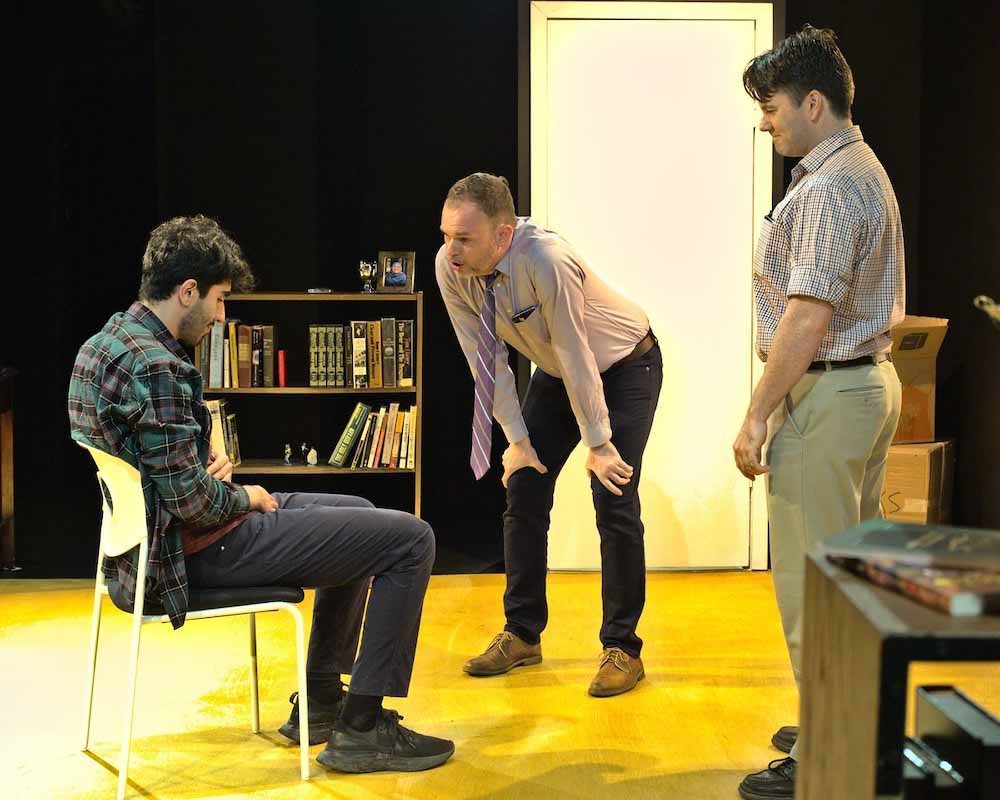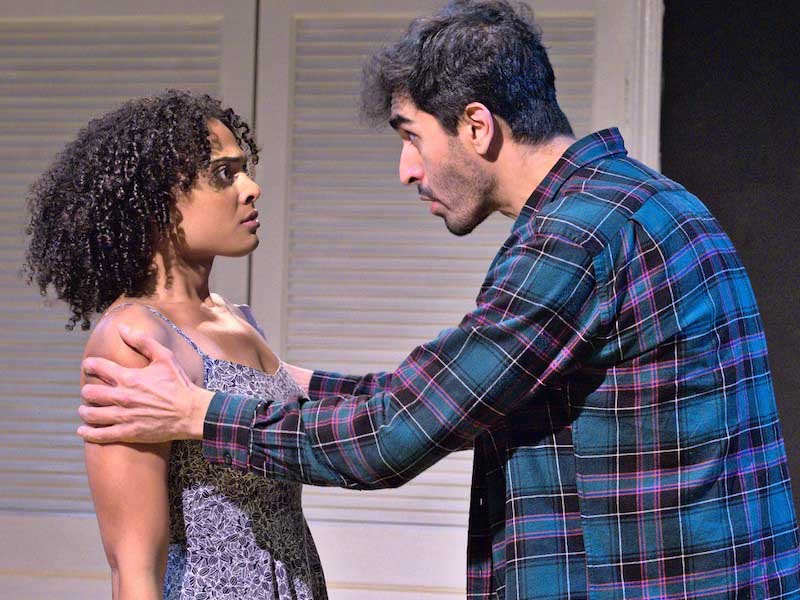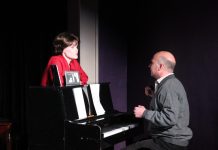In the aftermath of 9/11, the Department of Justice received some 96,000 tips about suspicious persons, mostly Arab and Muslim men, U.S. as well as foreign citizens. Many of these tips resulted in visits from FBI or other law enforcement agents. Hundreds of people were arrested, especially in the NYC/New Jersey area. Many were denied counsel, and a significant number were held without charges under a distortion of Federal “material witness” statutes, which were used to detain people against whom there was not sufficient evidence to charge, in the hope that evidence would be developed later. Often, those detained were kept in solitary confinement or otherwise treated harshly.
This fear and loathing of Muslims as potential terrorists, and the denial of due process to persons suspected of involvement with them, forms the background of Yussef El Guindi’s 2004 play, Back of the Throat, now playing at Silver Spring Stage. That the situation the playwright addresses was very real does not suffice to make his play effective, however.

Khaled (Ramtin Vaziri), a U.S. citizen who appears to be a secular Muslim, is visited in his home by two agents of an unidentified government agency. Bartlett (Drew Cannady) and Carl (Justin Bigelow) attempt to use a combination of informal persuasion, intimidation, bullying, and physical beating to elicit damaging admissions from Khaled. It seems clear that Bartlett and Carl did not finish near the top of their class in interrogation school, their approach to their suspect being exceedingly clumsy. Were it not for their malevolence, thuggishness, and obvious prejudice against immigrants in general and Muslims in particular, their incompetence would be comical.
Khaled is a character who, rather than taking action in his circumstances, is acted upon by others. At first, he asserts his constitutional rights to fend off the agents’ questions, only to be told that those rights are nothing the government needs to respect concerning someone like him. As Bartlett and Carl toss Khaled’s apartment, they tie anything they find — a copy of the Quran, a copy of a porn magazine, a book about guns — into their pre-existing narrative that Khaled knows more about terrorist activities than he is willing to let on.
Confirmation bias — the tendency to accept information unquestioningly when it reinforces some predisposition, existing belief, or attitude we have — is at the heart of the agents’ approach to the case. They configure ambiguous information to fit their narrative from a series of “witnesses” who pop out of Khaled’s closet. First, there is Shelly, a local librarian, who describes a brooding Muslim man who later perished in an unspecified terrorist incident. Played by Lena Winter in a brief role, Shelly is the most rounded and empathetic character in the play.

Shortly thereafter, the closet disgorges Beth (Briana Cortesiano), Khaled’s antagonistically shrill ex-girlfriend, who believed that Khaled kept too many things to himself and may have been having an affair. She is followed by Jean (Caroline Adams), a stripper in a local club who gave Khaled a rather ineffectual lap dance and noted that he spent a suspicious 15 minutes in the restroom with the same Muslim man Shelly had seen at the library. That none of these witnesses are necessarily reliable narrators, and that they voice suspicions rather than deliver facts, doesn’t matter to Bartlett and Carl, who are eager to grasp any straw that fits the story that they believe.
Hazma Elnaggar gives Asfoor, the Muslim man cited by other witnesses, a quiet dignity that eludes the other characters. His final monologue — itself ambiguous — fills in some of the connection between him and Khaled about which Khaled has not spoken to the agents.
Writing believable dialogue is not easy, and El Guindi often resorts to formulaic expression by characters — especially the agents — who are more types than individuals. In an attempt to humanize the agents, El Guindi gives them occasional lines in which they muse unconvincingly about the effect on their souls of having to brutalize suspects.
The piece is plodding; although given the construction of the script, it would be difficult to lay blame for its pace at the feet of director Nicholas Bashour. However, Bashour does use a few times too often the device of having one or both agents physically back Khaled into a corner.
Islamophobia and denials of due process in the wake of 9/11 are serious issues, and even as COVID and the Russian invasion of Ukraine have displaced terrorism as the main focus of public anxiety, “othering” disfavored groups remains a danger worth guarding against. Whatever its limitations, Back of the Throat has value in illuminating that danger.
Running Time: 85 minutes, with no intermission.
Back of the Throat plays through April 2, 2022, at Silver Spring Stage, 10145 Colesville Road, Silver Spring, MD. Performances are at 8:00 p.m. Friday and Saturday and 2:00 p.m. on Sundays. Tickets ($22–$25) are available online or at the box office an hour before performances.
Content Advisory: This play addresses racism, racial profiling, and terrorism and includes simulated physical violence and sexual intimacy.
COVID Safety: Silver Spring Stage requires that patrons present a photo ID and show proof of vaccination — a physical or digital copy of a vaccination card — at the time of entering the theater. Masks are required for all audience members for the production.
Cast
Ramtin Vaziri – Khaled
Lena Winter – Shelly
Briana Cortesiano – Beth
Justin Bigelow – Carl
Drew Cannady – Bartlett
Caroline Adams – Jean
Hamza Elnaggar – Asfoor
Production Team
Stage Manager – Denise Gilmore
Asst. Stage Manager – Michal Kaufer
Artistic Liaison – Jeff Mikoni
Set Designer/Master Carpenter – Jeffery Asjes
Lighting Designer – Don Slater
Sound Designer – Matthew Datcher
Costume Designer – Sara Collins
Props Designer – Karen Fleming
Intimacy Choreographer – Helen Aberger
Fight Choreographer – Bill Dunbar
Producer – Jackie Williams





